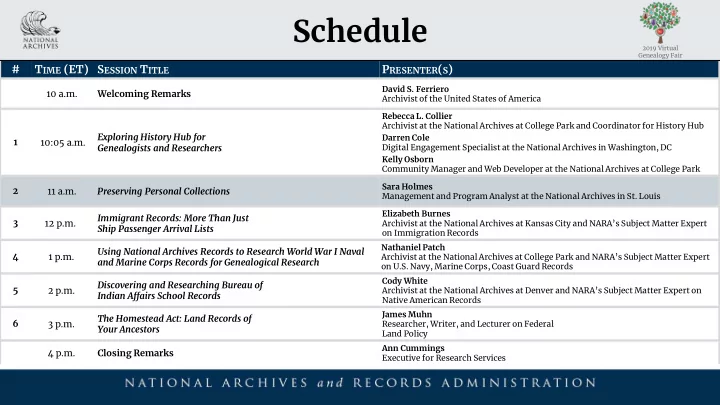

Schedule 2019 Virtual Genealogy Fair # T IME (ET) S ESSION T ITLE P RESENTER ( S ) David S. Ferriero 10 a.m. Welcoming Remarks Archivist of the United States of America Rebecca L. Collier Archivist at the National Archives at College Park and Coordinator for History Hub Exploring History Hub for Darren Cole 1 10:05 a.m. Genealogists and Researchers Digital Engagement Specialist at the National Archives in Washington, DC Kelly Osborn Community Manager and Web Developer at the National Archives at College Park Sara Holmes 2 11 a.m. Preserving Personal Collections Management and Program Analyst at the National Archives in St. Louis Elizabeth Burnes Immigrant Records: More Than Just 3 12 p.m. Archivist at the National Archives at Kansas City and NARA’s Subject Matter Expert Ship Passenger Arrival Lists on Immigration Records Nathaniel Patch Using National Archives Records to Research World War I Naval 4 1 p.m. Archivist at the National Archives at College Park and NARA’s Subject Matter Expert and Marine Corps Records for Genealogical Research on U.S. Navy, Marine Corps, Coast Guard Records Cody White Discovering and Researching Bureau of 5 2 p.m. Archivist at the National Archives at Denver and NARA’s Subject Matter Expert on Indian Affairs School Records Native American Records James Muhn The Homestead Act: Land Records of 6 3 p.m. Researcher, Writer, and Lecturer on Federal Your Ancestors Land Policy Ann Cummings 4 p.m. Closing Remarks Executive for Research Services
Preserving Personal Collections 2019 Virtual Genealogy Fair Sara Holmes Audience Skill Level: All Personal collections are valued for photographs, as well as film, audio, their importance to understanding and video. Providing the best family history. Do you know how to environment and storage will allow best preserve your treasured papers family heirlooms to be available for and heirlooms so they can by generations, while understanding passed on? This sessions will proper handling and copying can provide tips and information on the expand their availability and care and storage of paper, books, enjoyment with distant kin.
Presenter Biography 2019 Virtual Genealogy Fair Sara Holmes started working at the National Archives in Preservation Programs at St. Louis in 2007. She is currently a Management and Program Analyst, but previously served as a Supervisory Preservation Specialist to oversee conservation work at St. Louis. Before coming to the National Archives, she was a conservator at Texas Tech University and the Missouri State Archives. Ms. Holmes has a Master’s in Library and Information Science with a Certificate of Advanced Study in Conservation of Library and Archival Materials from the Sara Holmes University of Texas and a Master’s in History from the University of New Orleans. She is also a Certified Archivist and was selected as a member of the first cohort of the Archives Leadership Institute in 2008.
Preserving Personal Collections 1
Looking at what you have 2
What you might think a conservator’s personal collection looks like 3
Reality! Organizing and housing collections is time- consuming, difficult, and expensive! Don’t expect to tackle everything at once. You can determine your own priorities. Most importantly, you can improve storage even if you don’t have the “right” boxes or housings! 4
Top Tips: Temperature and Humidity Avoid storing your materials in basements and attics or near bathrooms and kitchens and in places with • High temperatures • High humidity • Extreme fluctuations in temperature and humidity 5
Top Tips: Keep Off the Floor! 6
Top Tips: Pests 7
Top Tips: Light 8
Top Tips: Dust 9
Top Tips: Storage 1 0
Good Housings Fully Support Too large for the folder 1 1
Avoid Over-Fill 1 2
Watching Out for Problem Materials Some older photo processes may create mirror images on Highly acetic materials like surfaces they are placed news clippings can be isolated against. from other materials with folders. 1 3
Books 1 4
Top Tips: Handling Materials 1 5
Handling 1 6
Photographs/Film 17
Working with Old Albums 18
Metal Items 19
Textiles 20
Electronic/Magnetic Devices 21
22
Making Copies or LOCKSS.org : L ots o f C opies K eep S tuff S afe 23
Digitizing Your Collections 2 4
Questions to ask Vendors: 1. Will you do a pilot test? 2. Do you digitize in-house? 3. What file type am I getting back? (.mp3 for sharing, .wav for archiving) 4. Do you adjust your equipment to get the best quality product? 2 5
Setting Your Own Priorities: 1. Do as much as you can for maintaining a controlled environment and keeping your collections away from high humidity, temperature fluctuations, or where they may be vulnerable to bugs. 2. Seek to improve boxes, folders, and any additional housings used -- as much as possible. At a minimum, use clean boxes that have never been wet and seek to isolate materials that may damage other items in your collection. 3. Determine personal priorities for potential reformatting, digitization, and conservation care. 4. Consider contacting cousins to determine if other copies of things you have that are damaged or in poor condition exist elsewhere. Also consider pooling resources among family for reformatting early films, slides, etc. 2 6
Where do I go for help? www.archives.gov/preservation www.culturalheritage.org Email preservation@nara.gov 27
Thank you! Questions? 28
Thank you for attending! 2019 Virtual Genealogy Fair Please stay tuned for the next session. If we did not get to your question, you may submit it to preservation@nara.gov Video recording and handouts will remain available at www.archives.gov/calendar/genealogy-fair
Feedback 2019 Virtual Genealogy Fair We value your opinion. Please take a few minutes to complete a short evaluation. Your comments help us maintain the quality of our services and plan future programs. Click ⇒ Event Evaluation www.surveymonkey.com/r/KYREventEval
Recommend
More recommend